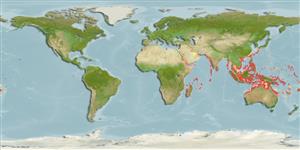Teleostei (teleosts) >
Ovalentaria/misc (Various families in series Ovalentaria) >
Pomacentridae (Damselfishes) > Pomacentrinae
Etymology: Amblyglyphidodon: Greek, amblys = darkness + Greek, glyphis = carved + Greek, odous = teeth (Ref. 45335).
More on author: Bleeker.
Environment: milieu / climate zone / depth range / distribution range
Ecology
Marine; reef-associated; non-migratory; depth range 2 - 45 m (Ref. 7247). Tropical; 35°N - 24°S, 32°E - 172°W
Indo-West Pacific: from the Eastern Indian Ocean; north to Ryukyu Is.; south to Indonesia, including Western Australia up to the Caroline and Marshall Is.
Size / Weight / Age
Maturity: Lm ? range ? - ? cm
Max length : 14.4 cm TL male/unsexed; (Ref. 30504)
Dorsal spines (total): 13; Dorsal soft rays (total): 12 - 13; Anal spines: 2; Anal soft rays: 12 - 14. This species is distinguished by the following characters: D XII-XIII,12-13 (usually XIII,12); A II,12-14 (often II,13); pectoral rays 16-17; lateral line tubed scales 14-17; gill rakers total, 25-29; body depth is 1.5-1.8 in SL; colouration, silvery grey with paler scale centers and yellow belly, the anterior half of anal fin and anterior margin of soft dorsal fin and the upper and lower margins of caudal fin is blackish; upper pectoral fin base with a distinct wedge-shaped black mark (Ref. 82240).
Adults inhabit lagoons, reef passages, and the outer reef slopes as solitary individuals or in small groups. Feed on copepods, amphipods, mysids, fish eggs, crustacean larvae, and a small portion of algae (Ref. 7247). Oviparous, distinct pairing during breeding (Ref. 205). Eggs are demersal and adhere to the substrate (Ref. 205). Males guard and aerate the eggs (Ref. 205).
Life cycle and mating behavior
Maturity | Reproduction | Spawning | Eggs | Fecundity | Larvae
Oviparous, distinct pairing during breeding (Ref. 205). Eggs are demersal and adhere to the substrate (Ref. 205). Males guard and aerate the eggs (Ref. 205).
Allen, G.R. and J.E. Randall, 2002. A review of the leucogaster species complex of the Indo-Pacific pomacentrid genus Amblyglyphidodon, with descriptions of two new species. aqua, J. Ichthyol. Aquat. Biol. 5(4):139-152. (Ref. 82240)
IUCN Red List Status (Ref. 130435: Version 2024-2)
Threat to humans
Harmless
Human uses
Fisheries: minor commercial; aquarium: commercial
Tools
Special reports
Download XML
Internet sources
Estimates based on models
Preferred temperature (Ref.
123201): 24.9 - 29, mean 27.9 °C (based on 666 cells).
Phylogenetic diversity index (Ref.
82804): PD
50 = 0.5005 [Uniqueness, from 0.5 = low to 2.0 = high].
Bayesian length-weight: a=0.01995 (0.01150 - 0.03460), b=2.95 (2.80 - 3.10), in cm total length, based on LWR estimates for this species & (Sub)family-body (Ref.
93245).
Trophic level (Ref.
69278): 3.4 ±0.39 se; based on food items.
Resilience (Ref.
120179): High, minimum population doubling time less than 15 months (Preliminary K or Fecundity.).
Fishing Vulnerability (Ref.
59153): Low vulnerability (10 of 100).
Nutrients (Ref.
124155): Calcium = 95.7 [46.9, 147.0] mg/100g; Iron = 0.78 [0.46, 1.29] mg/100g; Protein = 18.3 [17.1, 19.4] %; Omega3 = 0.123 [0.073, 0.207] g/100g; Selenium = 25.1 [12.9, 48.9] μg/100g; VitaminA = 142 [42, 461] μg/100g; Zinc = 1.33 [0.88, 1.92] mg/100g (wet weight);
